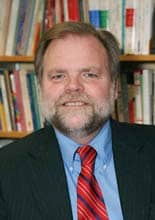Editor's Note: This article is part of an online symposium, "Does Seminary Have a Future?" hosted at Patheos this month. Read other perspectives here.
Philosopher Alfred North Whitehead once asserted that the higher organisms "originate novelty to match the novelty of the environment." These are definitely times of novelty for congregations, denominations, seminaries, and other religious institutions. While once the center of peoples' lives, the church has been relegated to the margins—culturally, politically, and spiritually. In the marketplace of spiritual practices and world views, Christianity now competes on an even playing field with the other great religious traditions as well as new religious movements. Many people get their theology and metaphysics from the History and Discovery Channels, workshops, popular books, and online resources rather than the traditional sources of religious practice and theology. Moreover, both within and beyond the church, many people have hybrid spiritualities, synthesizing Buddhism, reiki, yoga, and Christianity with little integration or counsel from their priest or pastor. Seminaries often operate, even in world religions classes, as if such hybrid spiritualities are unimportant in the lives of pastors, congregants, and seekers.
Survival rather than mission has characterized many institutional responses to the changing economic, social, and spiritual landscape. Faced with the challenges of finances, cultural polarization, and religious pluralism, many seminaries have retrenched, placing themselves on institutional life support, when innovative action is needed. Seminaries will survive and flourish only if they commit themselves to creativity, novelty, adventure, and prudent risk-taking. While many seminaries will continue to limp along toward irrelevance, healthy seminaries will be adventurous in pedagogy and outreach. In so doing, they will discover that the margins may, in fact, become spiritual and professional frontiers.
Holism.At one time, the seminary was considered the mind of the church. Seminaries were oases of creativity and wisdom aimed at preparing spiritual leaders and providing guideposts on the path to salvation. Theology was a matter of both the head and the heart. If theology wasn't practical and transformational, it was of little importance. Professors were practitioners, who joined pulpit and classroom, pastoral care and academic research, and mission and meditation. Theological education was a matter of life and death in sharing the faith and ministering to people at the edges of life.
Today's seminaries need to claim a holistic vision of spiritual formation in which body, mind, and spirit are seen as interdependent. Theological education needs to be reconceived as whole person in nature. By this, I mean that teaching and research need to be directed to the concrete affairs of congregational, community, and planetary well-being. Every class in seminary needs to address the "so what?" issues of life, that is, how do these ideas shape congregational life, evangelism, administration, preaching, Christian formation, and social concern.
My own pedagogy is multi-faceted. Regardless of what course I'm teaching or seminar I lead, I invite participants to consider questions, such as the following:
- How do these ideas shape my understanding of ministry?
- How does this relate to the congregation's involvement in the community?
- Does it preach? If so, how would it shape your preaching?
- What are the practical implications of these ideas for administration, pastoral care, mission, evangelism, and social involvement?
- How would you explain this to a child or a layperson in ways that will transform their lives?
While I enjoy times of scholarship for its own sake, I believe that theological education must be mission-inspired. It must, as Stephen Covey asserts, begin with the end in mind. Accordingly, the scholarship of seminary professors must connect with visions of faithful excellence in professional and pastoral life. Seminary must become a beacon of professional excellence, well-being, creativity, and innovation. A transformed pedagogy will lead to transformed visions and practices among professors, pastors, and congregations.
More than that, theological education needs to nurture a truly holistic vision of ministry. In my programs with pastors in every season of ministry from first call to pre-retirement, participants considered issues of self-care, ongoing professional education, congregational systems theory, social context, and visioning. These were seen in the context of professional support, practical guidance, theological reflection, prayer, and communion. Such programs are not only models for field education but also for the classroom, whose aim is deepening the call to ministry and equipping seminarians to be healthy, competent, and effective pastors. This should be the explicit goal of every seminary class, regardless of subject.





